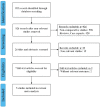Is neoadjuvant chemoradiotherapy for pancreatic cancer beneficial: A systematic review and meta-analysis
- PMID: 36505795
- PMCID: PMC9727153
- DOI: 10.3389/fonc.2022.979390
Is neoadjuvant chemoradiotherapy for pancreatic cancer beneficial: A systematic review and meta-analysis
Abstract
To examine the potential benefits and adverse events of neoadjuvant Chemoradiotherapy (CRT) versus upfront surgery in pancreatic cancer (PC) patients. Extensive librarian-led literature searches were conducted on PubMed, Web-of-Science, Scopus, Google Scholar, the Cochrane Central Library and Embase. The primary outcomes were resectability, adverse events, pathological and survival outcomes. Five studies, including 437 participants, were analyzed. Upfront surgery had a significantly higher resectability among PC patients than neoadjuvant CRT group (Odds ratio = -0.11, 95% CI = -0.19-0.02, P = 0.01). The neoadjuvant CRT group had a comparatively higher Ro resection rate (OR = 3.38, 95% CI = 2.03-5.62, P < 0.01), fewer severe adverse events(OR = 0.56, 95% CI = 0.34-0.92, P = 0.02), lower positive LN rate(OR = 0.18, 95% CI = 0.11-0.31, P < 0.01) and higher 2-year OS(OR = 1.60, 95% CI = 1.02-2.52, P = 0.04) among PC patients than control group. There was no significant difference between neoadjuvant CRT and upfront surgery among PC patients on postoperative complications(OR = 1.49, 95% CI = 0.86-2.57, P = 0.16), metastasis rate(OR = 1.32, 95% CI = 0.42-4.18, P = 0.64) and 1-year OS(OR = 1.30, 95% CI = 0.85-1.98, P = 0.22). This systematic review confirmed the status of neoadjuvant CRT in the PC treatment. The neoadjuvant CRT could increase the R0 resection rate, which was important to the survival and life quality of patients. The specific choice of various neoadjuvant CRT therapy needs to be further studied. Individualized neoadjuvant therapy should be suitable for each patient, and patients with PC are best managed by a multidisciplinary team.
Keywords: adverse events; complication events; neoadjuvant CRT; overall survival; upfront surgery.
Copyright © 2022 Luo, Wang, Tao and Zhang.
Conflict of interest statement
The authors declare that the research was conducted in the absence of any commercial or financial relationships that could be construed as a potential conflict of interest.
Figures




References
-
- Huguet F, Rivin Del Campo E, Labidi M, Ménard J, Sergent G, Durand B, et al. . [Gastric and pancreatic cancers: Will neoadjuvant (chemo)radiotherapy replace adjuvant chemoradiotherapy?]. Cancer radiotherapie J la Societe francaise radiotherapie oncologique (2020) 24:493–500. doi: 10.1016/j.canrad.2020.05.006 - DOI - PubMed
Publication types
LinkOut - more resources
Full Text Sources
Research Materials

